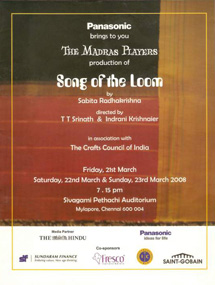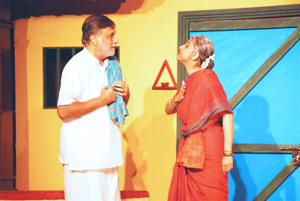UNDER ONE ROOF emerged after Sabita Radhakrishna participated in a playwrights’ workshop conducted by Mahesh Dattani at the British Council.
It is a play of three generations and their relationship with one another and their coping with familial pressures. Bhagirathi Narayan, Yamuna, Anuradha Ananth and Indrani Krishnaier were the main actors. UNDER THE ROOF was read at the British Council, along with the other plays written by the participants
 When we reached out to several villages in Tamil Nadu which were important centres for traditional handloom weaving, I was appalled to find that very few weavers cared to weave traditional handloom saris, especially the cotton korvais which are famous in the South. The reasons? Low wages, poor working conditions, lack of continuous orders, and the call of nearby industries. The sons of the traditional weavers are lured by higher wages and I found the parents encouraged them to leave, rather than watch them experience the rigours of hard work, with no rewards if they remained in their vocation. It was a Catch 22 situation. If we were concerned for their welfare we should let them go, at the same time could we afford to lose our precious heritage of handlooms?
When we reached out to several villages in Tamil Nadu which were important centres for traditional handloom weaving, I was appalled to find that very few weavers cared to weave traditional handloom saris, especially the cotton korvais which are famous in the South. The reasons? Low wages, poor working conditions, lack of continuous orders, and the call of nearby industries. The sons of the traditional weavers are lured by higher wages and I found the parents encouraged them to leave, rather than watch them experience the rigours of hard work, with no rewards if they remained in their vocation. It was a Catch 22 situation. If we were concerned for their welfare we should let them go, at the same time could we afford to lose our precious heritage of handlooms?
I strongly feel that we should lobby for more wages for the weaver and create awareness in the minds of the public and the powers- that- be as to the seriousness of the situation. One old weaver told me sadly that in a decade the traditional korvai handloom will be extinct .Can we accept the ubiquitious Kancheepuram sari relegated to museums? It may be argued that the sari is still popular in its modern avatar. While we cannot halt the wheels of modernity and its innovations, we cannot let traditional skills die. Never mind if the handlooms sit in a niche market. We need to tap at many doors and request the corporate sector to join hands with us in allowing the sons of weavers to pursue their skills hand in hand with their working for them. I found that this situation was not existent in Tamil Nadu alone, but in many States where very skilled weaving is required. Extreme poverty and frustration has led to many suicides in some parts of Andhra Pradesh and Benares.
And thus flowed Song of the Loom. The idea of this play is to create awareness of the problem in the minds of all who see it with the hope that they should go home and seek solutions if they care for our country’s priceless tradition.. Since Crafts Council of India’s primary objective is to preserve these traditional skills, CCI sponsored the play on the first day of its showing.
Such was the subject with a powerful social theme that Madras Players came forward to stage the play and the 16 actors of Song of the Loom acted their parts with such passion and commitment that the writer in me was more than just satisfied. Madras Players is the oldest English theatre group in India and all the members are professional and like our Crafts Council members who work in a voluntary capacity, the Players participate for the love of theatre, often spending out of their pockets during preparation of a play.
 Song of the Loom is Sabita’s play which was accepted by Madras Players ( the oldest English theatre group in India) and staged as a major production in 3 houseful shows at Sivagami Pettachi Auditorium on March 21st, 22nd, 23rd in March 08.
Song of the Loom is Sabita’s play which was accepted by Madras Players ( the oldest English theatre group in India) and staged as a major production in 3 houseful shows at Sivagami Pettachi Auditorium on March 21st, 22nd, 23rd in March 08.
We at Crafts Council are happy to say that we had three houseful shows, and that too when the heavens sent an untimely deluge on the first day of the play. That did not deter the audience from attending the show. It had a great impact on all who saw it and many in the audience came forward to say how much the play appealed to them. Some called and sent emails to say that they appreciated the play greatly and that they did not know that the situation was so grave for the handloom weavers. What was heartening is that many have offered their support for the cause in whatever capacity possible. Response came from the students of NIFT as well.
CCI fervently hopes that the play will be taken to all the States where our affiliated Councils exist. We have received positive response and interest from Delhi Crafts Council, Crafts Councils of Andhra Pradesh, Karnataka and Tamil Nadu. These councils are working out the feasibility of meeting the budget etc, and any advice they need on the exercise, we would be happy to provide. We suggest a sale of weaves a week before the play to garner funds for working with at least one weaver community in the neighbourhood.
What do we get out of it? We will not be able to make a monetary gain out of the play but we should treat is as an advocacy programme which was what Kamaladevi was always stressing that we do.The play is our idea of creating awareness in the minds of the public so that in future they do not hesitate to pay more for these priceless saris. However hopeless the situation seems, we at the Crafts Councils cannot throw our hands up without a fight!
We have to think of the mission of Celebrating the Weaver and catalyse it into an ongoing process.
Song of the Loom will be staged in Hyderabad Shortly in association with Crafts Council of Andhra Pradesh. We are looking for sponsors for the play and anyone interested in supporting the cause and spreading awareness may please write to Sabita Radhakrishna at kittsabi@gmail.com
We are willing to take the play anywhere, and if other states are willing to sponsor the play, it would help if they got in touch with us.

